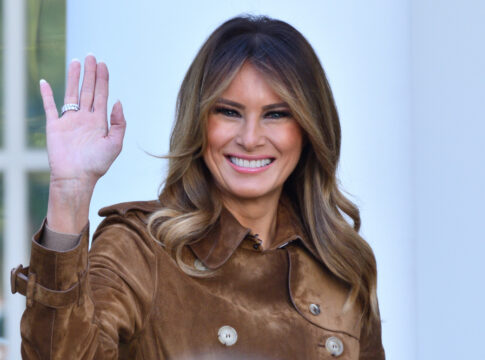First Lady Melania Trump takes center stage in battling online exploitation as President Trump signs the groundbreaking Take It Down Act aimed at criminalizing AI-generated deepfakes and revenge porn. Melania Trump lobbied extensively for the legislation and attended President Trump’s signing ceremony in the Rose Garden. Violators face up to three years in prison, and online platforms must remove explicit content within 48 hours.
First Lady Champions Digital Protection Law
President Donald Trump signed the Take It Down Act into law at a Rose Garden ceremony with First Lady Melania Trump by his side. The landmark legislation criminalizes the nonconsensual publication of explicit images and videos, particularly addressing the growing threat of AI-generated deepfakes. The bipartisan bill tackles inconsistent state laws by establishing federal standards for classifying these offenses and creating uniform penalties for violators, including mandatory prison sentences and restitution requirements.
The legislation received overwhelming support in Congress, passing unanimously in the Senate and by a 409-2 margin in the House of Representatives. Senators Ted Cruz (R-Texas) and Amy Klobuchar (D-Minn.) sponsored the bill in the Senate, while Representative Maria Elvira Salazar (R-Fla.) championed it in the House. The Federal Trade Commission will enforce provisions requiring websites to remove explicit content within 48 hours upon victim requests, addressing a critical need for swift action against digital exploitation.
Melania just spoke about the "Take It Down Act," which was passed in a bipartisan vote in Congress and is being signed into law by Trump.
We don't deserve her. Thank you @FLOTUS pic.twitter.com/BMmpdlD5H0
— Gunther Eagleman™ (@GuntherEagleman) May 19, 2025
Melania Trump’s Personal Advocacy
Melania Trump’s involvement in the Take It Down Act represents the culmination of her ongoing advocacy against digital exploitation. During the signing ceremony, the First Lady emphasized the particular dangers these technologies pose to young people. Her support for the legislation demonstrates her commitment to protecting vulnerable populations from predatory online behavior, especially as artificial intelligence tools make image manipulation increasingly accessible to malicious actors.
The First Lady took the unprecedented step of signing the bill alongside the President—a symbolic gesture with no legal effect but significant cultural impact. President Trump acknowledged her leadership role, thanking her publicly for championing this cause. The law comes in response to real cases of exploitation, including that of teenager Elliston Berry, whose image was manipulated into fake explicit photos, highlighting the personal devastation these technologies can inflict when misused.
🚨 #BREAKING: President Trump has officially signed Melania Trump’s TAKE IT DOWN Act into law — a huge WIN for families everywhere! 🇺🇸✨
This revolutionary bill demands Big Tech delete revenge prn within 48 HOURS 🔥 AND holds jerks accountable with JAIL TIME 🛑 The REAL heroes?… pic.twitter.com/2OcHieljk1
— Rafael Santiago (@RaphySantiag) May 19, 2025
Addressing AI Threats with Criminal Penalties
The Take It Down Act represents a significant expansion of federal protections against digital exploitation. It not only bans the distribution of nonconsensual intimate imagery but also criminalizes threats to publish such content. Violators face up to three years in prison, substantial fines, and mandatory restitution to victims. The legislation specifically addresses AI-generated content, acknowledging the rapidly evolving nature of technological threats to personal privacy and dignity.
“With the rise of AI image generation, countless women have been harassed with deepfakes and other explicit images distributed against their will. This is … wrong, and it’s just so horribly wrong. It’s a very abusive situation, like, in some cases, people have never seen before. And today we’re making it totally illegal.” – Trump
Online platforms now bear responsibility for content removal, facing potential liability if they fail to act promptly on victim requests. This aspect of the law acknowledges that swift removal is crucial to limiting harm, as digital content can spread rapidly across multiple platforms. The Trump administration emphasized that the bipartisan nature of the legislation demonstrates the universal recognition of digital exploitation as a serious crime requiring federal intervention regardless of political affiliation.


